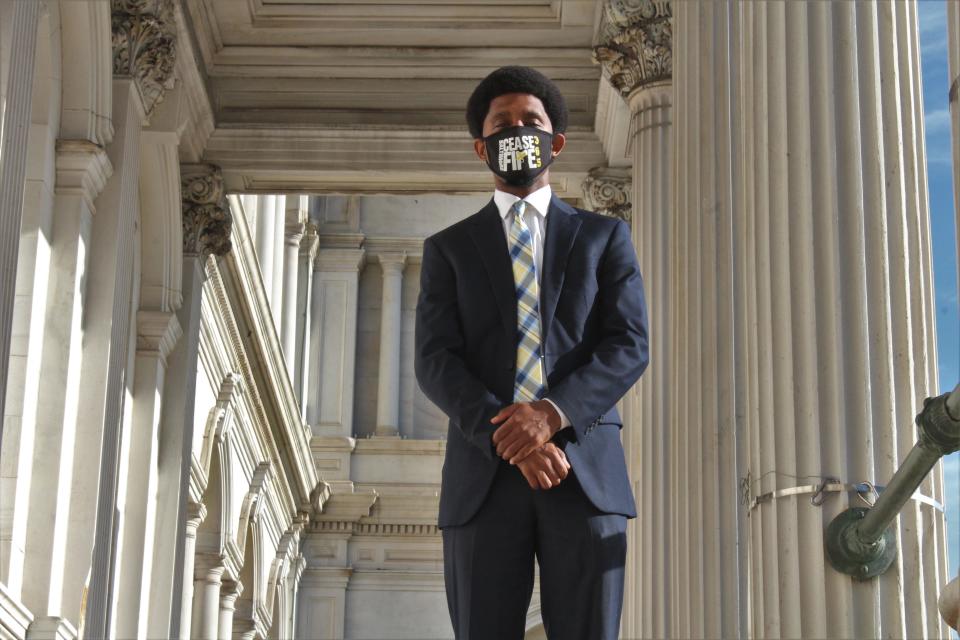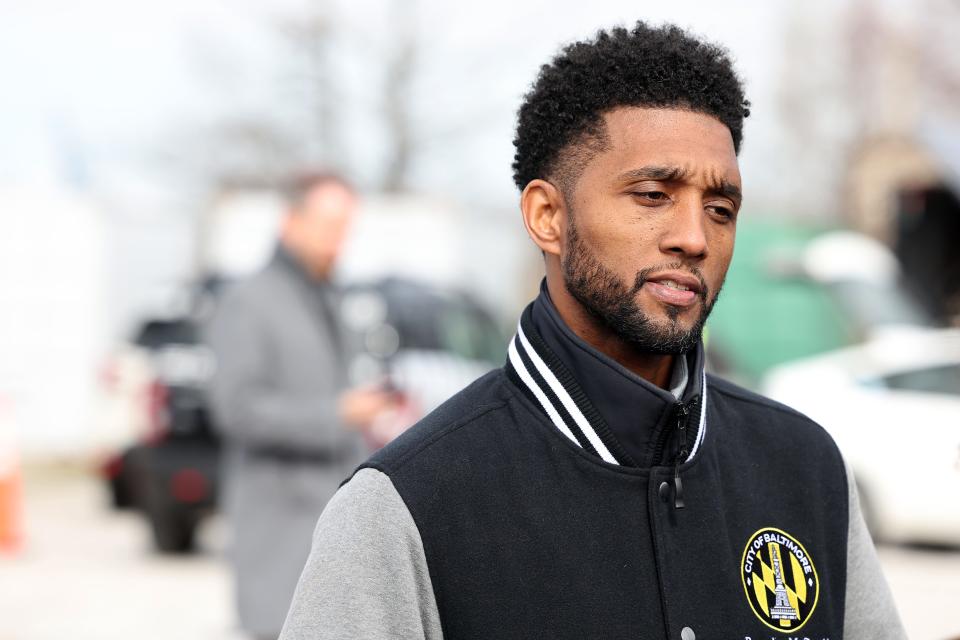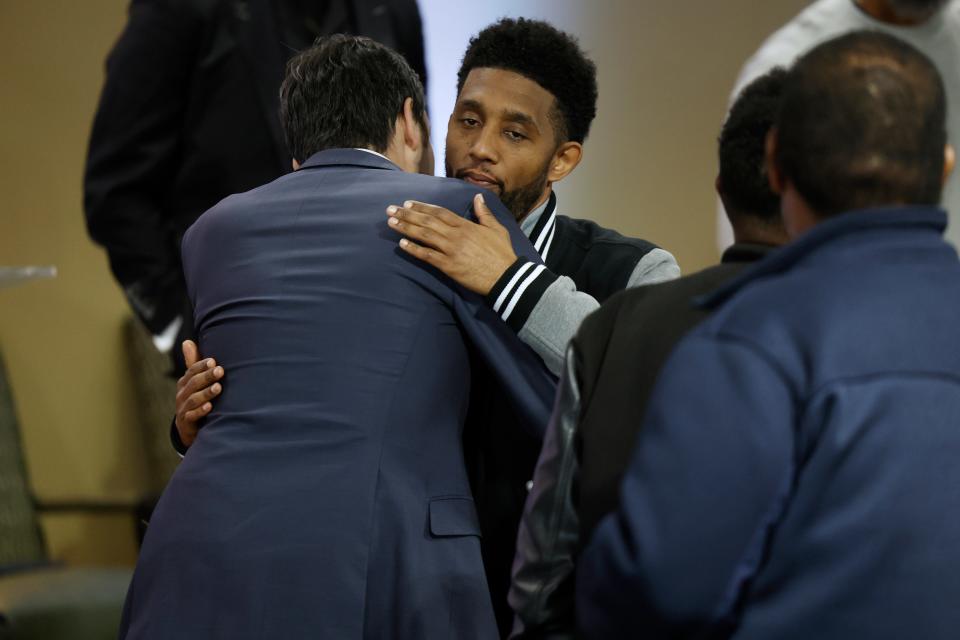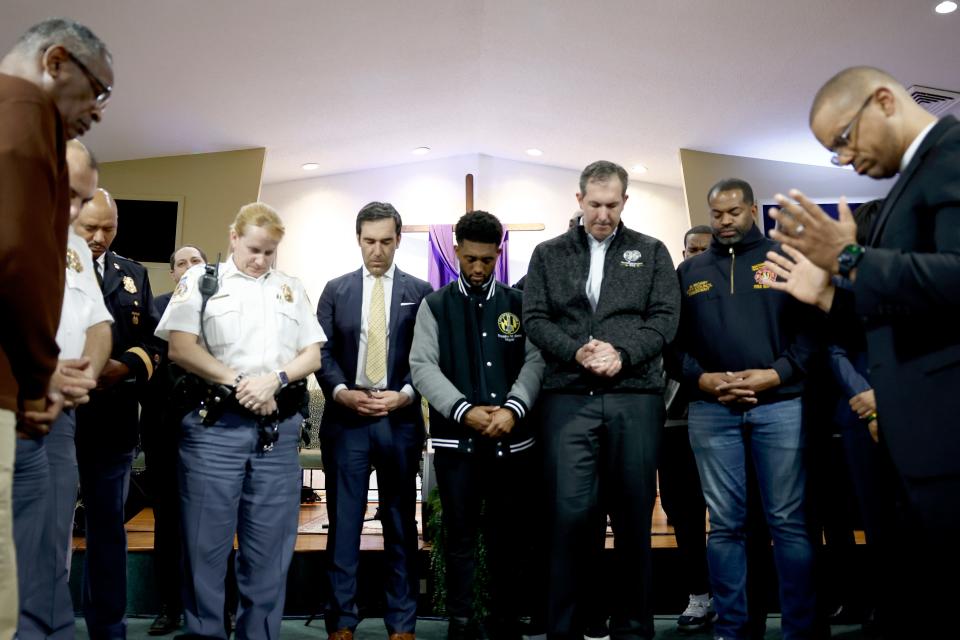In Baltimore, the city's youngest mayor faces triumph, tragedy in a single week
No one had seen a big-city mayor quite like Brandon Scott before.
He was 36 when he won his race in Baltimore in November 2020. In a city half a century older than the United States, Scott became the youngest mayor in its history.
Of course, no one had seen a November like the one in 2020.
It was the height of the COVID-19 pandemic. People across the country were largely still hunkered down. Scott wore a mask to his swearing-in ceremony. Nobody attended except his parents. He rocked an afro he had grown because the barbershops were closed.

We’re starting to forget some of this, four years later, but let us remember just how scary that time was. We were at the pandemic’s worst hour, when the death toll would reach 100,000 a month. Nobody knew how many more of us would die. The first vaccines were just starting to be approved. Most of us had no idea when we would get one.
“As your mayor,” Scott said at his swearing-in, “I will not waver or hesitate to make decisions that save lives and protect our economy.”
Three years and four months later, the mayor’s phone rang in the middle of the night. No one in Baltimore could imagine what they were about to see.
A hulking container ship lost control of its steering and careened into a tower of the Francis Scott Key Bridge. In a matter of seconds, that iconic bridge – traveled daily by more than 30,000 vehicles – plunged into Baltimore’s harbor.
Nobody knew, in those first predawn moments, how many people might have been killed, or what would happen next.
“This is a tragedy that you could never imagine,” Scott said Tuesday, during a news conference. “Never would you think that you would see – physically see – the Key Bridge tumble down like that. It looked like something out of an action movie.”
Reporters immediately wanted to know about the future, about the rebuilding of the bridge. Scott wanted to remain rooted in the present. He was emotional.
“We shouldn't even be having that discussion right now,” he said. "The discussion right now should be about the people, the souls, the lives that we're trying to save.”
“There will be a time to discuss a bridge and how we get a bridge back up,” Scott said. “But right now there are people in the water that we have to get out, and that is the only thing we should be talking about.”

It’s a heavy burden, isn’t it? The weight of 30,000 cars and trucks every day, of six bridge workers lost in 48-degree water, somewhere in the dark. The weight of 150,000 infections, of one person out of every 300 in your city having died of COVID.
But there’s a greater weight than that in Baltimore.
Saving lives in Baltimore
Scott, who grew up in Park Heights in Northwest Baltimore was 39 by now, a mayor who has spent a full term working to save people’s lives. I talked to him about that very thing, not so long ago.
We weren’t wearing masks, and we certainly weren’t talking about boats or bridges. We were talking, instead, about our most American contagion: The nearly 50,000 people who die of gun violence every year.
Baltimore has been a historically violent city. More than 300 murders a year, every year. Yet Scott has been fighting that narrative and winning.
Just Monday, he delivered his State of the City address, touting the largest single-year decline in homicides the city has ever seen. The 20% reduction marked the first time in nearly a decade that Baltimore saw fewer than 300 homicides a year.
It can be gleeful, and oftentimes sad, when you sign up for a leadership role in one of America’s vital cities. Calls for celebration may come, but also calls of catastrophe.
Scott received the news about the bridge collapse in the wee hours Tuesday, and was on the phone with Maryland Gov. Wes Moore while enroute to the bridge. On Tuesday, Moore acknowledged Scott before the TV cameras.
“Mayor Scott, who literally got a call the very first thing in the morning, I know you have had no rest in a very long time, sir,” he said. “I just want to say how much we appreciate you.”
Scott had just celebrated the declining homicide rate a day earlier. I wanted to know how America’s mayors respond to such unexpected adversity, especially after riding a high.
So I called Kansas City Mayor Quinton Lucas.
A leader's highs and lows
Lucas, too, had ridden a high. His Kansas City Chiefs had won the Super Bowl, and his city had readied a victory parade. Then a shooting at that parade left one person dead and about two dozen wounded, including nine children.
Scott and Lucas are friends. They met while serving as council members in their respective cities, long before they became mayors. They are the same age. They are Black men in public service who want to change the narrative – poverty, crime, poor schools – for their constituents. When the Chiefs played the Baltimore Ravens in the AFC Championship game, they watched together at M&T Bank Stadium.
“There was already kind of just a natural Black-dude-running-a-city thing,” Lucas told me Tuesday. “And in a way we wanted to be a breath of fresh air in terms of how a number of things are done. Some of which relates to how transparent we'll be, how authentic we might be, and frankly, presenting and bringing a new generation in cities that sometimes were controlled by those who may represent vestiges of the past.”
Two Mayors. Two Teams. One Winner! @QuintonLucasKC is my brother, but today, we are at war! #RavensFlock #Flockaroundandfindout pic.twitter.com/kqQVYealgo
— Brandon M. Scott (@MayorBMScott) January 28, 2024
Lucas said he sent Scott a text Tuesday, but didn’t expect a response. He certainly wasn’t going to call him in the time of crisis, but he just wanted him to know he had support.
“We as urban mayors know that there’s violence in our cities sometimes,” Lucas told me. “There may be an officer-involved shooting, there may be a significant fire – those are the kind of things we’re trained for. A dramatic, gigantic bridge – a gate that limits your ability to take part in an industry that is vital to your city – that to me is trying. And so I thought more personally about him.”
He described Scott as “one of the better mayors in our country, and certainly one of the more exceptional young leaders in our country.”
“It's easy to try to run in front of cameras,” Lucas told me. “I've met many leaders, many a mayor, who does that sort of thing. That is not Brandon.”
“I know the challenges of a bunch of national press people showing up – a lot of people want answers,” Lucas said. “The questions are tougher. It is not a normal day in Baltimore or Kansas City. It is a day where the most important listeners are those who first were directly impacted. Those who are families of those still missing. That’s where you start.”
The Francis Scott Key Bridge and the future
There are years of infrastructure, commuter and commerce challenges to come, too, of course. But the incident has been devastating for Scott, a man who has been vocal about the love he has for the city where he was born and raised. When I interviewed Scott in December, he spoke passionately about the Baltimoreans who lifted him up and encouraged him to dream.
“I have the total city showing me and telling me that I had to be better because it wasn't just about me,” Scott told me. “It was about me being a representation of all of them.”
In his fourth year as mayor, Scott now has a 3-month-old baby boy – his first child – named Charm after his beloved hometown, known as “Charm City.”
Now, Lucas said, Scott will lean into his compassion for people and his desire to see his city soar.

“He's somebody who actually isn't looking past you,” Lucas said. “You meet a lot of people … and you're like, ‘All right, well, that guy's plotting his run for governor. That guy's plotting his run for United States senator or he wants to be president one day.’ Brandon's a dude who's about Baltimore.”
Scott is also running for reelection. He is among 13 Democratic candidates in the May primary. It’s hard to imagine that’s his primary focus now.
Scott seems to be seeking friends – and divine support – as he navigates this even bigger crisis than COVID or city homicides. He knows the Key Bridge also provided financial life to those who live, work and travel through Baltimore.
“We know the power of prayer, and in this moment we need a lot of prayer,” Scott said at a Tuesday evening vigil.

Wednesday night, there was yet another news conference, this time more certain yet more sad. Moore and others promised support for the families of those who died, and asked the world for support in return. Then Scott, the mayor, stepped forward. Amid a line of suits and uniforms, he was the one in the purple sweatshirt that read: FROM BALTIMORE WITH LOVE.
“To each of the families,” he said, “know that my heart and the heart of the entire city of Baltimore is with you, and will be with you forever.”
USA TODAY national reporter N’Dea Yancey-Bragg contributed to this report.
Suzette Hackney is a national columnist. Reach her on X:@suzyscribe.
This article originally appeared on USA TODAY: Bridge collapse latest challenge for Baltimore Mayor Brandon Scott
